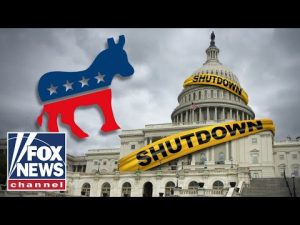In today’s political arena, the battle over government funding and policy priorities seems as endless as the universe itself. Once again, the nation is dangled over the precipice of a government shutdown, sparking heated debates between political factions. Some argue that the Republicans are playing a high-stakes game of poker, threatening a shutdown simply because a law didn’t swing in their favor. But let’s look at the real culprits here: the very essence of political negotiation and accountability.
Throughout history, Congress has been entrusted with the power of the purse, with the responsibility to fund government operations. There’s a humorous irony here in criticizing Republicans for daring to flex their legislative muscle. In the world of politics, everyone knows it’s about leverage. It’s about the art of the deal, not just sipping tea and nodding politely. Democrats are crying foul, perhaps because they find themselves in an unfamiliar situation—one where compromise isn’t simply an expectation but a necessity.
The current outcries of irresponsibility are predictable. Threatening economic shutdown? Refusing to pay bills? These are regular sound bites, flung through the airwaves with dramatic flair. Let’s not forget, the Republicans are in Congress to represent their constituents and fight for their vision of American policy. If that means taking bold stands, then so be it. When exactly did firm negotiating tactics become rebranded as “blackmail”?
To be sure, Congress must fulfill its duty to fund government operations. But holding lawmakers accountable and ensuring they represent voter interests are fundamental to democracy. Elections aren’t just ceremonial; they serve as a gauge for policy shifts. If politicians reserve the right to oppose what isn’t working for the country, isn’t that exercising due process as intended by the system?
In sum, the supposed “irresponsibility” of threatening government shutdown has been spun as villainy rather than what it truly is: a tool of governance. Democrats and those opposed to these actions might want to throw stones, but those living in glass houses should perhaps be wary. If parties can’t use every tool and strategy available to push their policy and uphold voter interests, then democracy itself is thrown under the bus – fiscal responsibility and all.







